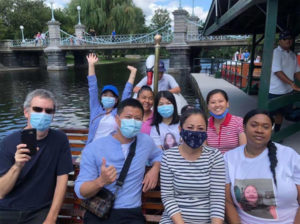Boston’s Asian American Civic Association (AACA) used the Teaching the Skills That Matter (TSTM) Health Literacy Toolkit to create an integrated health literacy awareness curriculum for its Next Steps ESOL (English for Speakers of Other Languages) classes. AACA organized the curriculum around three health topics particularly relevant to its learners: Covid-19 vaccines, Hepatitis B, and stress management. Organizers decided to focus on health literacy because of the need for accurate and timely health information regarding the Covid-19 pandemic. In addition, AACA has access to high quality educational health resources from its community partner, Asian Women for Health, a local health advocacy organization.
Following the TSTM teaching approach of Integrated & Contextualized Learning, AACA ESOL Program Director Shinobu Ando noted that the program “utilized students’ personal experiences, technical information from their local medical partners, as well as the knowledge and expertise of students who are working or have worked as medical professionals.”
 AACA had students search online and assess reliable health information, two best practices identified in the TSTM brief, Best Practices in Health Literacy: A Case Study. AACA learners interacted with accurate, highly relevant materials developed by their local health partners about Covid-19 vaccines and Hepatitis B, an avoidable disease prevalent in first-generation Asian and Pacific Islanders living in the United States. The instructors selected level-appropriate materials or built learning scaffolds in cases where the terminology or reading required advanced language skills. In researching health topics such as Covid-19 vaccines, students developed computer literacy skills and used critical thinking skills to determine if the information they found online was valid.
AACA had students search online and assess reliable health information, two best practices identified in the TSTM brief, Best Practices in Health Literacy: A Case Study. AACA learners interacted with accurate, highly relevant materials developed by their local health partners about Covid-19 vaccines and Hepatitis B, an avoidable disease prevalent in first-generation Asian and Pacific Islanders living in the United States. The instructors selected level-appropriate materials or built learning scaffolds in cases where the terminology or reading required advanced language skills. In researching health topics such as Covid-19 vaccines, students developed computer literacy skills and used critical thinking skills to determine if the information they found online was valid.
TSTM materials helped instructors integrate personal and workplace success skills, such as communication and critical thinking, with topics of high interest to students. During this unit, learners worked toward their overall goal of building English skills for college or training entry while developing critical thinking and information analysis skills, as well as building health literacy competency. To develop those analytical skills, learners organized new information, researched medical terminology, and analyzed their understanding of new material by developing follow-up questions about the topic. Learners were highly engaged in the lessons, sharing their personal experiences of coping with the stress of living through a pandemic, their vaccination experiences, and developing high-level questions to understand more about prevention and treatment of Hepatitis B for family members.
